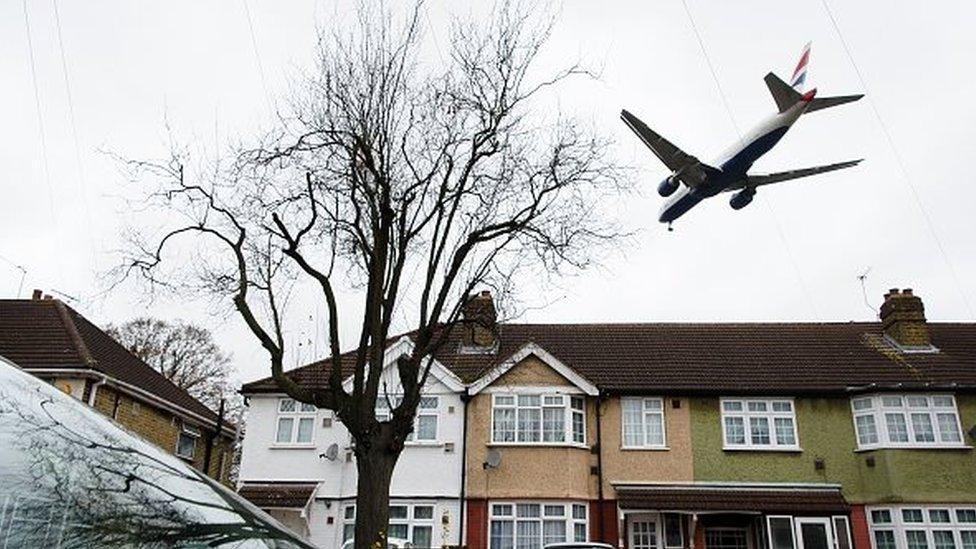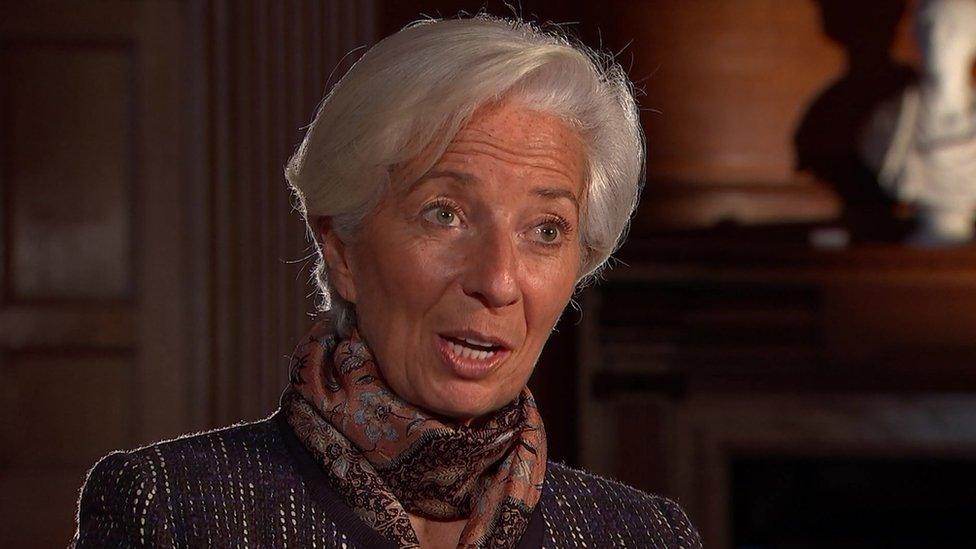IMF: Come on George, deal with aviation bottlenecks
- Published

Christine Lagarde, the managing director of the IMF, is not a politician. And makes it clear that decisions on "specific projects" are a matter for others, engineers for one.
But even she found it almost impossible not to add her voice to those expressing frustration at the government's decision last night not to give the go-ahead to a new runway at either Heathrow or Gatwick.
Mme Lagarde was in London for the publication of the IMF's latest assessment of the UK economy.
It painted a pretty positive picture. George Osborne, who welcomed Mme Lagarde to the Treasury this morning, said it was the "strongest assessment" he had seen in his five years as chancellor.
UK economy 'very strong'
The IMF says that growth is resilient (although it will slow slightly next year), real incomes are rising and productivity - the amount people produce for every hour they work - is improving, which should feed through to higher salaries.
When it comes to the UK economy: "There is clearly a range of policies that have worked," says the IMF's Christine Lagarde
It also supported Mr Osborne's plan to return the UK budget to surplus by 2020.
In past reports, the IMF has made it clear that spending on major infrastructure projects is vital for supporting economic growth.
Indeed, today Mme Lagarde praised the UK government for focusing on the issue in the Budget and Autumn Statement.
We are the makers, as Mr Osborne is fond of saying.
'Bottlenecks'
But, when it comes to aviation capacity, the government stands accused - by Willie Walsh, the chief executive of International Airlines Group which owns British Airways, for one - of putting tactical political considerations above strategic economic ones.
Not so much the makers, as the vacillators.
"I think our report this year highlights very clearly the transportation bottlenecks in the UK and infrastructure projects that will eventually remove those bottlenecks would certainly be conducive to more mobility [and] better growth going forward," Mme Lagarde told me.
I said it sounded like the head of the IMF thought the government should get on with expanding aviation capacity at Heathrow or Gatwick.
"I wish I was an engineer to actually decide which project is best for the country, but in general we support infrastructure projects, yes.
"Wherever there are bottlenecks, wherever there is congestion, clearly the engineers and the experts have to focus on what is best, what should come first and how quickly it should be [done]."
So, a little barb in an otherwise relatively positive picture for the UK.

In or out of EU?
We turned to the issue of the referendum on Britain remaining in or leaving the European Union.
In its report, the IMF highlighted uncertainty over the referendum as a risk factor which could have a negative effect on the outlook for growth.
I asked Mme Lagarde whether it was better for the UK economy if Britain stayed in or left the EU.
"I personally hope that the British economy is in the European Union but that's a personal option and personal choice," she answered.
And speaking as an economist?
"We generally, at the IMF, are for whatever opens up trade, facilitates exchanges, removes barriers, facilitates mobility of goods, capital, people," Mme Lagarde said.
"And it [the EU] has proven effective over the years so if the alternative was: trade would be harder, tariffs would be higher, the financial fluidity within the European Union would not be as good as it is at the moment, then it would not help."
She said that the IMF will now look at the economic consequences of Britain remaining in or leaving the EU.
It will produce a detailed report next spring.
Would it be better, I ask, if the government got on with holding the referendum as quickly as possible - if only to deal with the uncertainty many businesses say the prospect of a referendum creates.
"That's a political decision over which we do not opine," Mme Lagarde said.
"[But] more certainty is always better than more uncertainty."